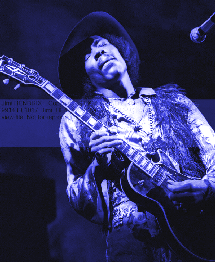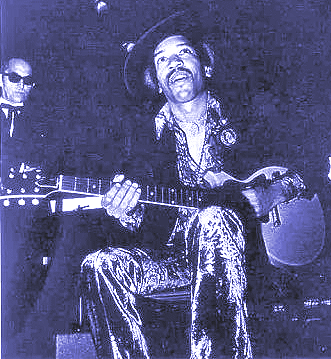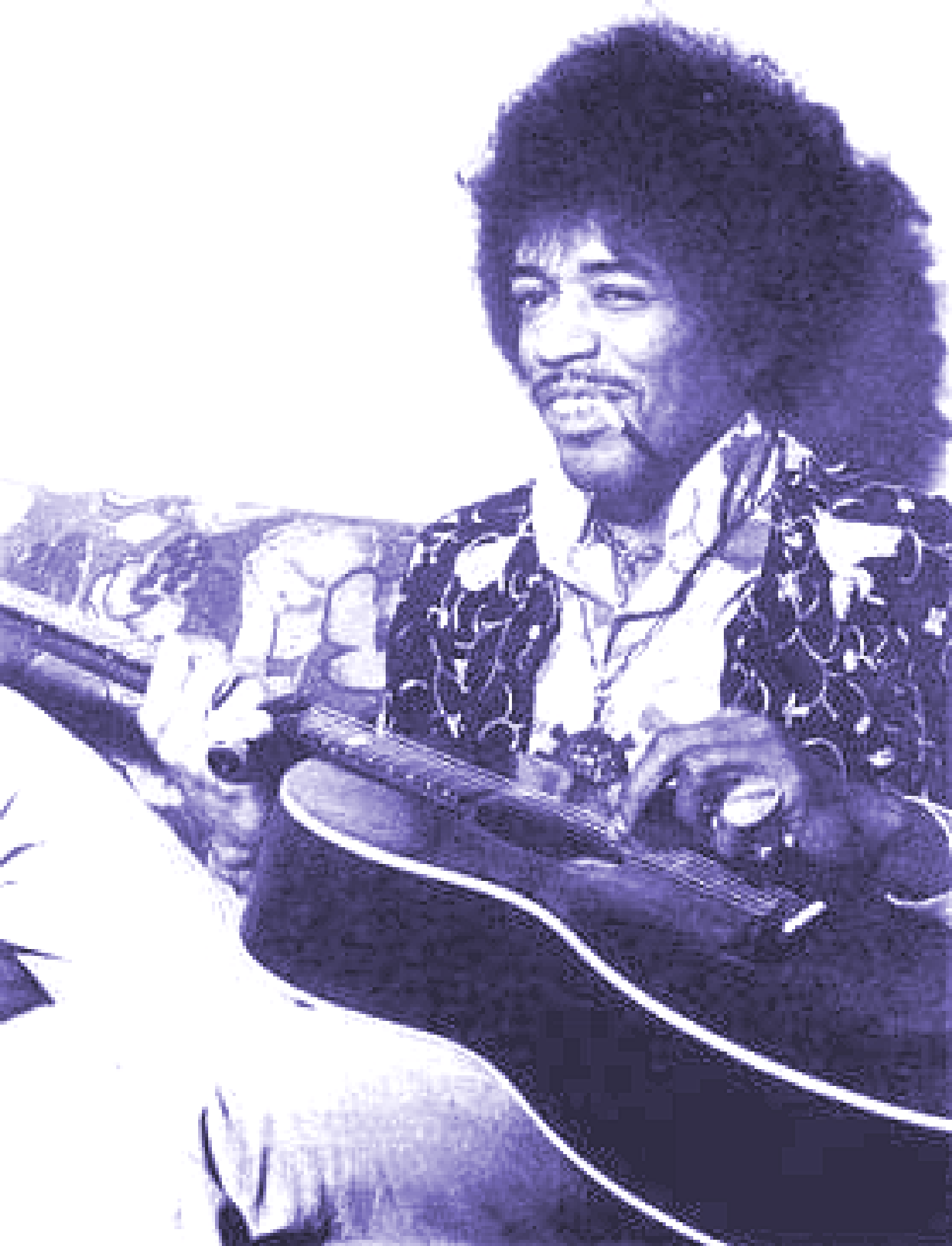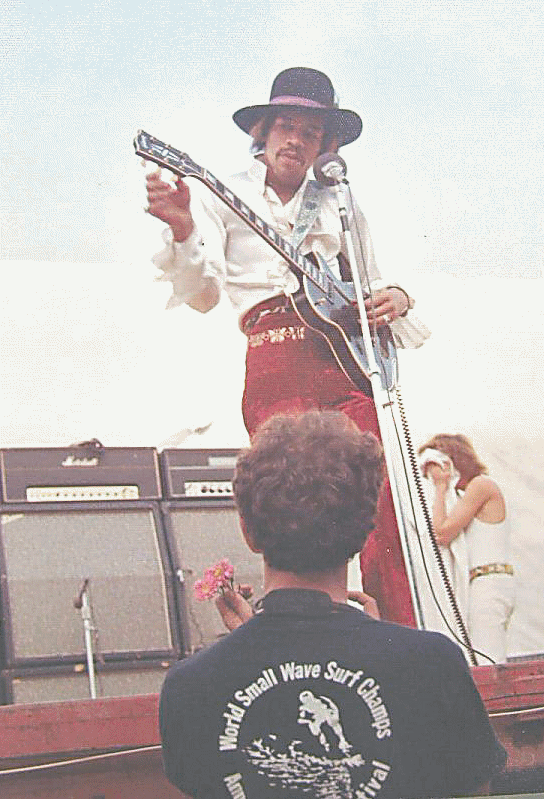 |
  |
 |
published: April 12, "1994"
Jimi Hendrix :Blues CD Booklet by Michael Fairchild |

Previews & What's New
Jimi's Prediction —
A Remote View About Jimi Hendrix Timeline Blog Asteroid Impact Evolution Woodstock Blues Jimi Code VS. Da Vinci Code Credit Thefts Missile Agency/Moon Base Charade Seattleland Censorship Events Skewed Science Search Engine Rankings Download An Ad AT&T: New Nuremberg The Wall(y)flower Syndrome Rochester Media DVD/CD Store More Links... 
Page 7 of 10
 "Hendrix jamming with Albert," Dick Waterman remembers, "I saw them together at the Scene in New York. I was managing Buddy Guy and Hendrix really liked Albert King." Buddy Guy recalls, "Those times at the Scene, Jimi just came and sat in, that was a good one. Hendrix needed to come in whenever I was playing; I remember on several occasions he'd have a gig somewhere and find out I was playing in New York and cancel. He'd come tell me, 'I cancelled a gig just to catch you, man.' Oh yeah, he was a good guy." Considering the tales Jimi told to John Hammond, it's not hard to imagine him telling Buddy Guy he canceled gigs to catch Guy's act, however, only a handful of Hendrix concerts were ever cancelled, and none of the reasons why has anything to do with Buddy Guy. "I think Hendrix was one of those guys that was so explosive," Buddy continued, "him and John Coltrane, way ahead of their time, so far-out. I used to play with a wah-wah pedal, like Hendrix and stuff like that. They made me throw away the wah-wah even before anybody ever heard of Hendrix. Understand they did him the same way. He had to go to London to have somebody listen to him. Every time I would turn my amp up to get a distortion at Chess, they would say, 'If you want to stay here, you better turn it down or go home.' No, I did not show them what Buddy Guy created. Which at the time I didn't know I was creating anything, it didn't even cross my mind."
 "The spirit of Hendrix haunts and intimidates those who will never understand his spiritual commission," charges Billy Cox. "Rather than acknowledge his greatness, there are those who would explain it away or overshadow it. Always some distortion or outright lie is used." "(My son) told me," Buddy goes on, "that he saw this interview on public television with Hendrix, and Hendrix said he stole some licks from Buddy Guy, and (my son) was crying. He said, 'Dad, I didn't know you could do that.' And I said, 'Son, you never asked.'" No such quote from Hendrix exists and Dick Waterman recalls the Scene differently, "Jimi used to ask Buddy about Otis Rush, which was a big insult! Instead of appreciating Buddy for what he was, he used to ask Buddy about Otis Rush, who at that point was very obscure, but he was left handed. Jimi was fascinated by other left handed players because he knew they were the distinct minority. People who string right handed and turn it upside down, they're going to get a specific tone on their guitar that is simply different." Left-handed people rely more on the right hemisphere of the brain, where less structured thinking and heightened creativity takes place. Also, leftys, on average, live ten years less than right-handers. Southpaws inherit centuries of superstitions about the sinister nature of the left-hand path. They have a certain touch on guitar, especially with the "devil's music". Left handed bluesmen are like double-taboo outlaws. But Jimi was an outlaw even to blues. Half of the blues community didn't want him either. At today's crossroads of the first one hundred years of blues, it is revealing to note that a school of thought remains embedded in many heads refusing to acknowledge Hendrix as a bluesman at all.
 In 1970 Jim O'Neal co-founded Living Blues, America's oldest blues magazine. O'Neal was in England when Jimi died and he recalls, "Probably the average listener doesn't think of Hendrix as a blues player, although he obviously was. I think it's because when he became known he was so much a part of the rock circle and covered in the rock press and everything. And the fact that his early background, because he sort of came up through the ranks playing in the R&B bands, and not really the hard blues bands. If he had played six months with Howlin' Wolf or Muddy Waters his name would've been in the blues magazines already, but he didn't, he was playing with Little Richard and Jackie Wilson, and whoever, you know, it's a different circuit so he didn't have any prior blues credentials that had been printed anywhere or was publicized when he became a rock star, so it was like as far as the blues public knew he wasn't ever sort of in their sphere. I don't know of any blues magazine that's done an article on Hendrix, except Blues World (obscure U.K. newsletter 1965-1973), a short article, and it's really just an appreciation." In Nothing But The Blues Larry Cohn described playing certain records for blues purists, "You'd play Blind Boy Fuller or you'd play some mid-period Lonnie Johnson, and they didn't want to hear it. You know, 'We don't want to hear that city shit, nothing beyond Charley Patton!' And it was hysterical. God forbid you'd try to play something like Bill Monroe to show some blues aspects of country music. They'd be ready to kill."
 In 1993 you could flip past photos of Johnny Winter and Robert Cray in Nothing But The Blues and flip through sections on Bonnie Raitt and Nina Simone in Blues - The Essential CD Guide and still you won't find Jimi. Ed Komara, librarian for the Mississippi Blues Archives reports that, "If you go to the original archivists and say 'I'd like to look up Hendrix,' they'd say, 'well, it's not blues, thank you very much.'" In fact, it took B.B. King donating his personal record collection to the Blues Archives in order for Jimi to be represented at all. "B.B. has the British versions of Are You Experienced? and Axis:Bold As Love in there," explains Komara. "That's where we have our only copies of Hendrix." B.B. sympathized when he said, "I think that many people just put labels on, thinking that has a lot to do with it, but I disagree, it has to do with the person, the inner soul of the person." "What I don't like is this business of trying to classify people," added Jimi. "It's just going to take time to reach these labelers with our sounds. Sometimes they don't listen to something because it sounds completely alien to what they've been used to. I don't like classifications, regardless of the scene. Now and then I like to break away and do a bit of classical blues. I love the blues, but I wouldn't want to play it all night. It's just like although I like Howlin' Wolf and Otis Rush, there are some blues that just makes me sick. I hate labels, and the one that calls me a witch doctor is terrible."
|
| © 1994 First Century Press. All Rights Reserved. Contact Us |
